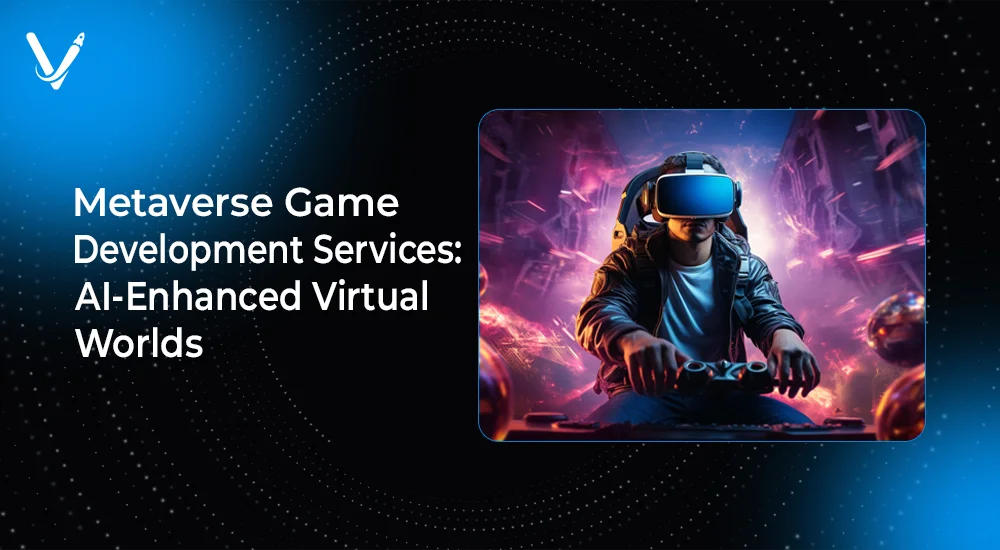Metaverse Game Development Services: AI-Enhanced Virtual Worlds


- Oct 8, 2025



Imagine stepping into a digital world where the boundaries between reality and imagination dissolve—a space where you can build cities, own virtual land, interact with lifelike characters, and earn real-world value. This is no longer science fiction; it is the metaverse, a rapidly evolving ecosystem reshaping how humans interact with technology, entertainment, and the economy.
As the metaverse expands, game development services play a central role in shaping its foundation. Games are not merely entertainment within this realm—they are the engines that drive engagement, community, and innovation. And at the heart of this transformation lies artificial intelligence (AI).
AI is redefining how virtual worlds are built, how they respond, and how players experience them. It empowers developers to design adaptive environments, intelligent NPCs (non-playable characters), and personalized interactions that feel alive. The fusion of AI and metaverse game development is turning static digital experiences into self-evolving, player-driven universes.
This blog dives deep into the intersection of AI and metaverse game development services—exploring how intelligent technologies are transforming design, gameplay, and business opportunities. You’ll discover how AI creates immersive virtual worlds, what technologies power them, how businesses are leveraging these ecosystems, and why the future of gaming is inseparable from AI-driven innovation.
To understand the role of AI in metaverse game development, it’s important to first grasp what the metaverse truly represents.
The metaverse is a shared, persistent, and interconnected digital universe where users can interact in real-time through avatars, digital assets, and immersive environments. It combines 3D virtual spaces, blockchain-based ownership, extended reality (XR) technologies like VR and AR, and AI-driven interactivity.
Unlike traditional online games, metaverse environments are not limited to a single experience. They are living ecosystems where users socialize, work, play, and trade. Each element—characters, landscapes, marketplaces, or objects—can hold real-world value and evolve dynamically.
The metaverse, when paired with AI, becomes not just a space to play—but a self-evolving ecosystem capable of learning and growing with its users.
AI is the driving force behind metaverse evolution. It allows developers to design living, breathing worlds where every element—from the environment to characters—responds intelligently.
Traditional games rely on pre-programmed characters with limited interactivity. In the metaverse, AI-powered NPCs can learn, adapt, and evolve based on player actions.
These AI-driven entities can engage in conversations, remember interactions, and even form relationships with players. Natural Language Processing (NLP) enables them to communicate with human-like expressions, making social interactions within the metaverse feel authentic.
For example, in an AI-powered metaverse game, a digital shopkeeper may recall your past purchases, recommend items based on preferences, or negotiate prices—creating personalized, lifelike engagement.
Building vast 3D worlds manually is resource-intensive. AI automates procedural content generation, creating expansive terrains, cities, and ecosystems on the fly.
Machine learning algorithms analyze design patterns and player behaviors to generate environments that feel organic yet diverse. The result? Every player experiences a world that is uniquely their own while maintaining coherence with the global metaverse narrative.
AI-driven analytics monitor how users interact with the virtual world—tracking decisions, play styles, and emotional cues. This data helps the game adapt dynamically, offering challenges, quests, or environments tailored to individual users.
Imagine a metaverse game where the world evolves according to your choices. If you prefer exploration over combat, the system introduces new landscapes instead of battles. Such AI personalization keeps players deeply engaged and emotionally invested.
AI enhances physics simulation and character animation, making interactions more natural. Deep learning models predict motion, body dynamics, and object responses, reducing the need for manual animation.
Combined with AI motion capture, developers can achieve lifelike expressions, gestures, and fluid movement that mirror human realism, even in stylized virtual avatars.
The metaverse thrives on human connection. AI enables emotional depth by analyzing voice tone, expressions, and sentiment. Avatars can mirror emotions, respond empathetically, and adjust interactions in real-time.
This technology not only improves immersion but also facilitates mental health support, social storytelling, and emotional AI companions within virtual spaces.
Within the metaverse, economies are powered by blockchain and digital assets. AI optimizes this ecosystem by managing transactions, analyzing market trends, and preventing fraud.
AI models predict token valuation, optimize in-game marketplaces, and detect malicious activity to ensure fair trade. For players, this means more transparent, intelligent economies that evolve organically.
AI agents handle world moderation, bug detection, and content moderation automatically. These systems monitor player behavior, detect anomalies, and maintain a safe virtual environment without human intervention.
By combining AI moderation with decentralized governance, developers maintain balanced and inclusive virtual communities.
Metaverse game development brings together a suite of cutting-edge technologies that integrate seamlessly with artificial intelligence to create immersive digital universes.
Virtual Reality (VR) and Augmented Reality (AR) immerse players within the metaverse. AI enhances these experiences by tracking gaze, movement, and gestures, allowing realistic interaction with digital objects.
For example, AI-assisted spatial mapping enables VR headsets to interpret real-world environments, blending physical and virtual spaces for deeper immersion.
Blockchain ensures decentralized asset ownership, while smart contracts automate transactions like NFT trading and play-to-earn rewards. AI enhances this ecosystem by identifying market patterns, optimizing token economies, and securing transactions.
Together, AI and blockchain create transparent, self-regulating economies inside the metaverse.
IoT devices connect the physical and virtual worlds. Smart sensors capture environmental data—such as temperature or movement—which AI algorithms convert into real-time metaverse interactions.
Imagine a virtual concert reacting to audience pulse data collected through wearable devices, transforming experiences based on real human feedback.
Latency is critical in multiplayer virtual environments. Edge computing brings data processing closer to the user, ensuring smoother gameplay and faster AI computations.
AI models deployed at the edge allow real-time responsiveness, essential for immersive metaverse experiences.
Massive data streams generated by AI and user interactions require powerful storage and scalability. Cloud platforms host dynamic assets, synchronize player data, and power real-time AI analytics to maintain fluid performance across global networks.
Developing for the metaverse is complex, requiring expertise in design, programming, AI integration, and blockchain architecture. Professional metaverse game development services bring all these elements together.
Every metaverse world starts with a vision. Creative teams design narratives, world logic, and artistic direction aligned with player engagement goals. AI tools assist in procedural storytelling and world consistency checks.
Developers use tools like Blender, Unreal Engine, and Unity, enhanced by AI-based texture generation and object optimization. AI simplifies modeling by predicting geometry and creating realistic materials automatically.
Developers implement AI-driven systems for NPCs, behavior analytics, recommendation engines, and adaptive world building. Reinforcement learning ensures that AI models evolve based on player feedback.
AI-enhanced blockchain integration allows secure token economies and decentralized governance. NFTs represent ownership of items, land, or characters—each tracked and analyzed by AI for authenticity and value.
AI supports interoperability by analyzing compatibility issues between different virtual worlds and automating asset transfer systems. This allows players to move seamlessly across experiences.
Metaverse analytics platforms use AI to study player behavior, retention rates, and economic activity. Developers use this data to improve game mechanics, ensuring sustained engagement and profitability.
AI-driven testing tools simulate thousands of gameplay scenarios, identifying bugs or performance issues before launch. Post-release, AI handles real-time performance tuning, ensuring scalability and stability.
The metaverse is not just about experiences—it’s about economy. AI plays a central role in powering virtual financial ecosystems that mirror and often surpass real-world dynamics.
AI algorithms analyze demand and supply trends for virtual goods, ensuring fair and adaptive pricing. Just like stock markets, metaverse economies fluctuate, and AI helps stabilize value by predicting economic shifts.
AI ensures balance in play-to-earn models by monitoring inflation, optimizing reward distribution, and maintaining game integrity. This prevents token oversupply and keeps in-game economies sustainable.
AI continuously monitors transactions, identifying irregular activities such as market manipulation or asset duplication. Machine learning models strengthen cybersecurity, protecting both players and developers.
AI-driven recommendation engines suggest virtual goods or assets based on user preferences. Players experience shopping like never before—customized, interactive, and deeply engaging.
Social engagement is the soul of the metaverse, and AI is redefining how people connect within these digital universes.
AI-driven avatars can understand emotions, mimic facial expressions, and participate in natural conversations. Machine learning models interpret voice tone, speech patterns, and gestures, creating emotionally intelligent virtual companions.
These AI avatars can host events, guide users through worlds, or even act as personal assistants within games. Over time, they learn user preferences, forming long-term bonds that enhance immersion and community engagement.
Virtual concerts, classrooms, and corporate meetings powered by AI-driven metaverse technology are already redefining entertainment and collaboration.
Storytelling in the metaverse is unlike traditional narratives—it’s dynamic, adaptive, and user-driven. AI enables procedural storytelling, where the plot unfolds based on user choices and collective community actions.
Imagine a fantasy world where every player’s decision influences the global story arc. AI ensures logical continuity and emotional depth, adjusting character dialogues, missions, and endings in real-time.
Generative AI tools also create side quests, landscapes, and dialogues spontaneously, ensuring infinite replayability and unique user experiences.
The result is storytelling that feels alive—co-created between developers, AI, and players.
AI-enhanced metaverse game development opens vast business possibilities beyond entertainment.
Every industry—from fashion to healthcare—is exploring how metaverse game frameworks can enhance engagement, revenue, and innovation.
While the AI-metaverse partnership is promising, it brings ethical and technical challenges.
Ethical design and sustainable AI models are crucial to ensure the metaverse evolves responsibly.
The future points toward autonomous metaverse ecosystems—self-sustaining digital worlds where AI maintains balance, generates stories, and supports entire economies.
Key trends shaping the next phase include:
As AI continues to mature, the metaverse will evolve into a living organism, adapting to humanity’s creativity and needs.
The fusion of AI and metaverse game development represents a monumental leap in digital innovation. These technologies are creating intelligent virtual worlds that think, feel, and evolve—blurring the lines between imagination and reality.
AI-driven metaverse games aren’t just entertainment—they are ecosystems where creativity, economy, and technology converge. From lifelike NPCs to self-learning environments, the future of gaming lies in AI-enhanced virtual worlds that connect players in ways never imagined before.
At Vasundhara Infotech, we are at the forefront of building these intelligent ecosystems. Our metaverse game development services combine AI, blockchain, AR/VR, and advanced 3D design to create immersive experiences tailored to your business vision. Whether you aim to develop a decentralized world, an interactive NFT game, or a social metaverse platform, our team delivers innovation that redefines engagement and growth.
Transform your ideas into next-generation virtual experiences. Connect with us today and build the future of AI-powered digital universes.
Copyright © 2026 Vasundhara Infotech. All Rights Reserved.